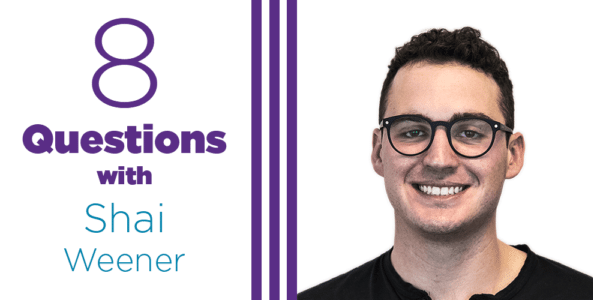
8 Questions with Shai Weener
In “8 Questions With…,” we share a brief Q&A with a staff member. In this edition, we hear from Shai Weener, who joined Rosov Consulting in 2017, with a background in quantitative analysis, survey research, and Jewish communal organizations.
1. What’s your area(s) of expertise and how has it been beneficial and led to success in your work?
There have been two sets of experiences that have been beneficial for my work at Rosov – my work in college and my time involved with many of our client-organizations. In college, I studied statistics and engaged in a multi-year social science research project, which showed me the importance of asking the right questions and always keeping one eye on the end goal. When it comes to my experience with many of our client-organizations, I have either been involved with their programming in the past or am currently still a participating member of their community. This experience allows me to look at the surveys from the perspective of the respondents and offers the ability to tailor such instruments to the necessary audience.
2. What experiences have led you into your current career path?
I grew up involved Jewishly on several fronts — through Jewish youth organizations, Jewish day school, Hillel, Masa, and Moishe House. Through these organizations, I saw and continue to see the various and powerful ways that Jewish organizations benefit the larger, diverse Jewish community. These experiences, paired with my 17 years at Camp Yavneh in New Hampshire, are really what led to my current career path. When it came time to think about my career, I wanted to further my involvement and support of such organizations — although in a different capacity. Thus, when I heard about Rosov Consulting, I knew it was the path for me.
3. What do you like learning about most through your work?
Through my previous experiences in Jewish organizations, I enjoyed working on the ground to further a larger mission through planning activities and facilitating discussions. Through my work now, I enjoy learning about the ways larger Jewish organizations view their mission when they have to think not just about one group in one community, but about numerous groups in numerous and diverse communities across the country.
4. What do you like most about working at Rosov Consulting?
I feel like the classic answer would be to say the people, but it is true. The group of people I get to work with are intelligent, fun, open, and encouraging (though don’t tell them I said so). Rarely do you get the opportunity to be in an environment where everyone genuinely wants you to succeed, both professionally and personally. Additionally, even within our small group, we have such a diverse set of experiences, opinions, and quirks; I look forward to team lunches or internal meetings when I get the opportunity to interact more with my colleagues.
5. What are some challenges of your work?
As a field that is inherently built on a joint professional relationship and personal/communal relationship, and as a person who was involved in many of these organizations, it can be difficult to separate our personal hopes and our professional data we have collected. Not all data comes in the way we want it to – wouldn’t it be great if every evaluation came back saying the programs were fantastic and the Jewish community was across the board thriving? While we do often see such encouraging findings, not everything is always as positive and encouraging as we may hope. Through our work, however, I get the privilege of meeting some of the most motivated individuals who use these difficult moments as a means of empowerment to move forward and strive for the best.
6. What have been the biggest changes in the field and/or your work specifically since you started?
Even in the past 10 months, I have seen an increase in recognition of the power (and beauty) of data. I have seen people’s eyes open to all the possibilities data offers. Those who start a project merely wanting to know how much of their population speak Hebrew, end the project curious about the different ways day school, camp, and youth group can affect a person’s long-term connection to and engagement in Jewish life.
7. How do you think your job and/or the field might change in the next 10 years?
I believe that in the next 10 years, there will be a greater emphasis on data knowledge, data collection, and data analysis in house – organizations will start to integrate data into their everyday organizational structure.
8. What do you think is essential reading to excel in your field?
The Signal and the Noise by Nate Silver. As a name many recognize for his perfect prediction of the 2012 presidential election – guessing all fifty states correctly – Silver discusses the power, and the limitations, of data. In a society starting to become so heavily focused on data, it is important to understand that there is such a thing as “too much data.” We have to be careful, because data can be overwhelming and misleading — creating what Silver refers to as “noise.”




